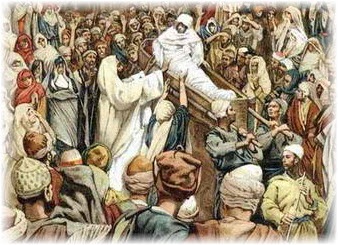On a purely human level, Jesus lived most of his life in obscurity, emerged as a prophetic figure for several years, and was eventually crucified. After his death and resurrection, layer upon layer of interpretation and understanding was put on his life and his ministry so that it has become extremely difficult to get to know the flesh and blood reality of Jesus.

The Gospel of Luke tells us that Jesus began his public ministry at the synagogue by reading the words of Isaiah: "The Spirit of the Lord is upon me, because he has anointed me to bring glad tidings to the poor. He has sent me to proclaim liberty to captives and recovery of sight to the blind, to let the oppressed go free, and to proclaim a year of favor acceptable to the Lord." And then he tells them: "Today this Scripture passage is fulfilled in your hearing."
There are two primary themes on which this gospel hinges: Jesus' compassion for the helpless and the pronouncement of Jesus as the fulfillment of the messianic prophecy. Through the power of the Spirit, Jesus reveals his identity by the acts he performs. So for Luke, it is important that Jesus announces his ministry by reading this particular passage. "Today these words are fulfilled in your hearing ." Today - and from now on - God's ancient promises are fulfilled. The signs that were to accompany the favored year included restored sight, healing for cripples and the deaf, and the raising of the dead. The greatest of these signs is the raising of the dead... a sign of God's promise of salvation's fullness - victory over death, complete freedom from sin.
Today's narrative - The story of the raising of the widow of Nain's son - appears only in Luke and it occurs in the seventh chapter of the Gospel, between two other activities where Jesus reveals his identity by the acts that he performs: the curing of the centurion's servant and the forgiveness of the sinful woman. With a simple touch to the coffin, Jesus cures the ultimate disconnect - death - and returns a son to his mother.
Jesus understood his ministry in terms of setting people free. We really need to understand this. His life and death were about changing people's minds and hearts. His work of salvation directly addressed the issues of fear, ignorance, and darkness which clouded the religious thinking and images of the people.
The issue for Jesus is: stand up and be counted; let the Spirit of God have its way with you - completely. Give all your mind and heart and soul to the "call" within you. This is conversion in its most radical form. This is conversion where it hurts most.
At the end of his life, there was no glory for Jesus, no resounding success. His dream was not realized. People simply did not convert. The powerful had their way with him. He broke down and cried over Jerusalem. In the garden the night before he died, he felt alone and helpless. Whipped, spat on, and mocked, he went to a shameful death abandoned by his friends and feeling abandoned even by God. And yet, this man reached deep into himself and refused to despair, refused to give up hope, refused to budge from his conviction that God is ultimately good, gracious, and to be trusted absolutely.
For most of us, the call to follow Jesus has not been very dramatic. There was no special moment, as in today's Gospel, when we are seized with awe and declare: "a great prophet has arisen among us!"
Most of us were baptized, and raised as Catholics in our younger days. We went through the activities of prayer and church and sacraments. We learned the basics of Christian doctrine. And probably after some years of questioning and wandering, we reached a point in adult life when we began to take our Catholic faith seriously - when our minds and hearts were radically changed by the Lord's touch.
For us the process of conversion means taking to heart the words of Isaiah that Jesus applied to Himself. We, too, are called to bring good news to the poor. We have been sent to proclaim liberty and freedom to those suffering oppression of any and every kind; we have been chosen to bring sight to the blind and to proclaim God's favor to all.
We, too, have been touched by the Lord: and this touch is as life-giving to us as it was to the widow and her son. It allows us to show all humanity, by our word and example, that its journey in time is really a journey toward Christ - a mysterious, spiritual journey which begins, continues and ends in Him.
 The Gospel of Luke tells us that Jesus began his public ministry at the synagogue by reading the words of Isaiah: "The Spirit of the Lord is upon me, because he has anointed me to bring glad tidings to the poor. He has sent me to proclaim liberty to captives and recovery of sight to the blind, to let the oppressed go free, and to proclaim a year of favor acceptable to the Lord." And then he tells them: "Today this Scripture passage is fulfilled in your hearing."
The Gospel of Luke tells us that Jesus began his public ministry at the synagogue by reading the words of Isaiah: "The Spirit of the Lord is upon me, because he has anointed me to bring glad tidings to the poor. He has sent me to proclaim liberty to captives and recovery of sight to the blind, to let the oppressed go free, and to proclaim a year of favor acceptable to the Lord." And then he tells them: "Today this Scripture passage is fulfilled in your hearing."




